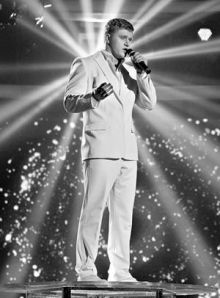The Day asked several questions to the winner of X-Factor, Oleksii KUZNIETSOV.
Oleksii, people even beyond the Donbas region are happy you won. Of course, some of them dream of repeating your success, in which, it seems, the ability to overcome the inertia of your surroundings played a huge role. What was your path to success like, from this point of view? What helped you: education or intuitive understanding of what the right path is?
“First, it was my education that helped me. Then — good physical shape. A performer needs it, as we go through great trials, both emotional and physical.
“As for society, I don’t think it is very inert, as such shows are broadcast. Maybe, it is not active enough, but this greatly depends on the country’s ‘climate,’ both economic and cultural.”
You are studying at the Academic Singing Department, Donetsk Music College, and work in the Donetsk-based Solovianenko Theater of Opera and Ballet. How does classical music fare in Donetsk and what should change?
“I would increase the attendance of our theater of opera and ballet. I would like to bring in the masses to my native ‘branch,’ popular classical music, which is performed by Il Divo, Lara Fabian, Andrea Bocelli. This genre is not yet represented by Ukrainian performers.
“I don’t think the levels of opera in Kyiv and Donetsk are essentially different. In my opinion, the only difference is that more investments come to the capital. Theaters have more opportunities to go on tours abroad. I for one would like to go more on tours, to show the mastery of our performers, and have more chances to practice.
“The Donetsk Theater sees full houses, but everything depends on the repertoire. The same goes for Kyiv. If there is a festival or a famed soloist performs, there will be a full house. Bringing such a soloist is another problem. In 2010 the international festival of opera art Gold Crown took place in Donetsk — it was attended by soloists from all over the world, from Japan to France. Therefore all tickets were sold out a month before the festival. If the same number of people came to see regular performances, this would show our country’s development.”
Since you have become a participant of a TV show, it would be proper to ask you: what does the Ukrainian TV audience lack?
“Ukrainian television lacks a specialized TV channel dedicated to music, which would show various music genres, not just pop-music or r’n’b, but also jazz, folk, opera, and pop-classics; a channel where one could learn how to become a vocalist, how to develop one’s voice (which is not so simple indeed, in Italy, for example, opera singing is compared to the work of a miner), what is the difference between various music genres, how music instruments are made. On the whole, we lack a TV channel that would perform an educational function.”
VIEWPOINT
X-Factor has left contradictory feelings
“As a UKRAINIAN consumer and connoisseur, as Ukraine’s citizen and an ethnic Ukrainian, I mostly want to consume Ukrainian products (in terms of content and form), not rejecting, of course, the best examples of art from other countries and nations, especially Russian, English, Polish, German, or American art. But our, so-called Ukrainian, media have for a long time been offering for our attention music, songs and performers mostly from our neighboring state, or those home-raised stars, who, like in a Soviet movie, once very popular, ‘are from here by their origins, yet foreigners by their education.’
“The many-month mega project of the STB TV channel, X-Factor, has left contradictory feelings. On the one hand, you admire the elegant, relaxed, emotional, talented and self-confident young people with beautiful voices. You even envy them: our generation did not have such an opportunity to be ourselves, behave the way it liked, to develop one’s skills and give way to one’s feelings in front of millions of TV-viewers. Clearly, all those are elements of the show, director’s work, game, and after all commerce. Still it is pleasant and interesting to watch.
“On the other hand, Russian language reigned on the TV screen, being the working language of both jurors and competitors, and the songs were mainly performed in Russian or other languages. Against this background, the attempts of the host to communicate with jurors and participants in Ukrainian looked miserable. Looking at her, I remembered the immortal Tarapunka and Shtepsel. After all, in a narrow circle, beyond the audience hall or studio, our carrier of all things Ukrainian very eagerly and joyfully switched to a ‘language understandable for everyone,’ which, perhaps following the directors’ intention, had to underline the comic effect, non-functionality and irrelevance of the Ukrainian language in a cultural and advanced milieu.
“So, there was freedom on the one hand, and fear to irritate the tender ears of the jurors and owners of the STB channel with the Ukrainian language on the other.
“Certain questions arise. If the whole world has recognized the Ukrainian nation as producing some of the best singers, and its language as one of the most melodious, if Ukraine has the richest heritage of folk songs in the world, if Ukraine is indeed an independent sovereign state, with nearly 80 percent of population being native — why don’t we deserve and why doesn’t at least one channel broadcast beautiful, truly Ukrainian music, be it folk, variety, or serious music performed by proud Ukrainians? Cannot a people with such an ancient and vast culture distinguish talented creators and performers from among themselves? The answer is that people who form the non-Ukrainian cultural policy in Ukraine, and on whom the mass media depend in terms of funding or administration, are not spiritually related to our land, they will never seek out of goodwill, develop and release to broad audiences the talents that are strange and hard to understand for them.”







